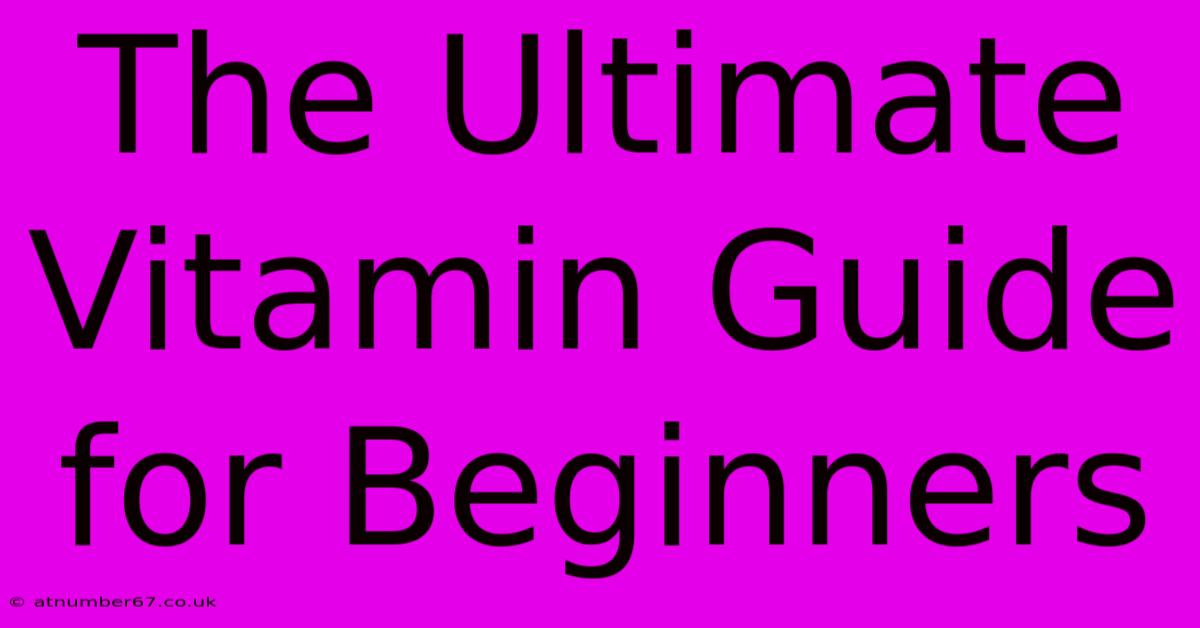The Ultimate Vitamin Guide For Beginners

Table of Contents
The Ultimate Vitamin Guide for Beginners
Are you confused by the alphabet soup of vitamins? Feeling overwhelmed by the sheer number of supplements on the market? You're not alone! This ultimate guide will break down the essentials, helping you understand which vitamins are crucial for your health and how to incorporate them into your routine.
Understanding Vitamins: The Building Blocks of Health
Vitamins are organic compounds vital for various bodily functions. They're essential nutrients, meaning our bodies can't produce them in sufficient quantities, so we must obtain them through diet or supplementation. They play a critical role in everything from energy production to immune function. There are two main categories:
Fat-Soluble Vitamins:
These vitamins are absorbed with fats and stored in the body's fatty tissues and liver. This means they can build up to toxic levels if taken in excessive amounts. The fat-soluble vitamins are:
- Vitamin A (Retinol): Crucial for vision, immune function, and cell growth. Found in liver, sweet potatoes, carrots, and leafy greens.
- Vitamin D (Sunshine Vitamin): Essential for calcium absorption, bone health, and immune function. Produced by the body when exposed to sunlight. Also found in fatty fish, egg yolks, and fortified foods. Many people need supplementation, particularly during winter months.
- Vitamin E (Tocopherol): A potent antioxidant that protects cells from damage. Found in nuts, seeds, and vegetable oils.
- Vitamin K (Phylloquinone): Important for blood clotting and bone health. Found in leafy green vegetables, broccoli, and Brussels sprouts.
Water-Soluble Vitamins:
These vitamins dissolve in water and are not stored in the body to the same extent as fat-soluble vitamins. Excess amounts are usually excreted in urine. The water-soluble vitamins are:
- Vitamin C (Ascorbic Acid): A powerful antioxidant that supports immune function, collagen production, and iron absorption. Found in citrus fruits, berries, and peppers.
- B Vitamins: This group includes several vitamins, each with its unique function but working synergistically to support energy metabolism, nerve function, and red blood cell formation. Good sources include whole grains, meat, poultry, fish, eggs, and legumes. Individual B vitamins include:
- Thiamin (B1): Energy production.
- Riboflavin (B2): Energy production, cell function.
- Niacin (B3): Energy production, DNA repair.
- Pantothenic Acid (B5): Hormone production, energy metabolism.
- Pyridoxine (B6): Brain development, red blood cell formation.
- Biotin (B7): Hair and nail health, cell growth.
- Folate (B9): Crucial for cell growth and development, especially important during pregnancy.
- Cobalamin (B12): Essential for nerve function and red blood cell formation. Primarily found in animal products.
Choosing the Right Vitamin Supplements
Before taking any vitamin supplements, it's crucial to consult your doctor or a registered dietitian. They can help determine if you have any deficiencies and recommend the appropriate dosage. Self-treating can be harmful, and some vitamins can interact negatively with medications.
Factors to Consider When Choosing Supplements:
- Quality: Look for reputable brands that undergo third-party testing to ensure purity and potency.
- Dosage: Follow the recommended dosage on the label, unless otherwise instructed by a healthcare professional.
- Form: Vitamins come in various forms, such as tablets, capsules, liquids, and powders. Choose a form that suits your preferences and needs.
- Ingredients: Check the label for added ingredients, such as fillers or artificial sweeteners, that you may want to avoid.
Getting Vitamins from Food: The Natural Approach
The best way to obtain vitamins is through a balanced and varied diet rich in fruits, vegetables, whole grains, lean protein, and healthy fats. This ensures you get a wide range of nutrients and reduces the risk of imbalances or overconsumption from supplements.
Focusing on Whole Foods:
Prioritize whole, unprocessed foods. These are generally far more nutrient-dense than processed foods. Eat the rainbow – incorporating a variety of colorful fruits and vegetables ensures a broad spectrum of vitamins and other essential nutrients.
Conclusion: A Healthy Approach to Vitamins
Vitamins are essential for optimal health and well-being. While supplements can be helpful in specific situations, a balanced diet remains the cornerstone of good nutrition. Always consult a healthcare professional before starting any vitamin regimen to ensure you're making safe and informed choices for your health. Remember, a proactive approach to your nutrition, combining a healthy diet with mindful supplement choices when needed, sets the stage for a vibrant and healthy life.

Thank you for visiting our website wich cover about The Ultimate Vitamin Guide For Beginners. We hope the information provided has been useful to you. Feel free to contact us if you have any questions or need further assistance. See you next time and dont miss to bookmark.
Featured Posts
-
Catriona Grays Age A Timeless Beauty Queen
Apr 02, 2025
-
Arjun Kapoors Net Worth A Comprehensive Overview
Apr 02, 2025
-
Ksi Net Worth From Gamer To Business Mogul
Apr 02, 2025
-
The Strength Of Jonah Hills Mother
Apr 02, 2025
-
Age Of Consent In Albania What You Need To Know
Apr 02, 2025
